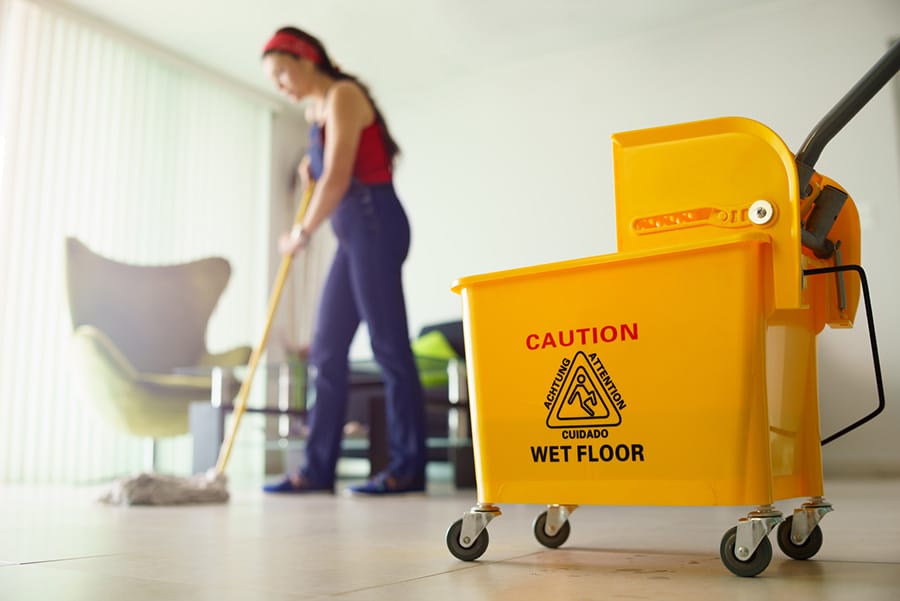Understanding workers’ compensation benefits for janitorial workers in North and South Carolina
Janitors, cleaners and custodians don’t receive enough recognition for the role they play in society. People who work in these professions are responsible for maintaining the functionality and safety of facilities everywhere. Their work makes the world a safer and more efficient place to live.
Due to the nature of janitorial work, workers are prone to certain types of injuries. Thankfully, many workers who are hurt on the job are entitled to workers’ compensation. Before examining that process, however, let’s look at the most common injuries for janitors, cleaners and custodians.
Common injuries for janitorial workers
Workplace injuries can be sorted into 1 of 2 categories: traumatic and gradual. Here’s a rundown of the common injury scenarios for custodial workers in each area.
Traumatic injuries
Traumatic workplace injuries are sudden and unexpected. These injuries often require fast and immediate medical treatment.
One common traumatic injury for custodial workers is slip and falls. Workers can instantly injure their hips, knees and shoulders, for example, by falling on slick, recently mopped surfaces. Additionally, workers who change light bulbs or otherwise work in elevated spaces are also at risk of falling from lifts and ladders. Other traumatic injuries that janitors, custodians and cleaners face come from their work with tools and machinery, which can result in electrical shocks, cuts, burns and other wounds.
Gradual injuries
Gradual injuries are those that develop over a long period of time. Many gradual injuries come from repetitive, physically stressful motions.
Janitors, for example, often move furniture, lift heavy items and push carts on a daily basis. These actions, over time, can lead to muscle strains, pulls and tears. Standing on concrete floors for extended periods of time can also have a detrimental effect on a worker’s ankles, knees and hips.
Another common gradual workplace injury comes from exposure to chemicals. Custodians, janitors and cleaners often work with harsh cleaners, disinfectants and acids. Frequent interactions with these substances leave some workers with damaged lungs, eyes and skin.
What should you do if you’re a janitorial worker who’s been hurt on the job?
No one asks to be hurt at work. If you’ve been injured, there are a few things to keep in mind as you navigate the early stages of your workers’ compensation claim.
Seek medical treatment immediately
If you get hurt at work, don’t try to tough it out. Doing so could jeopardize your ability to be compensated down the road. Instead, make your medical care a priority.
If your injury is traumatic and you need urgent care, consider visiting an emergency room. If you’re suffering from a gradual injury, it may be more prudent to speak with your human resources department to be seen by a workers’ compensation doctor. Keep in mind that under North and South Carolina’s workers’ compensation laws, you must be seen by a doctor that works with your employer’s insurance company.
Report your injury to a supervisor
When you recognize a problem, notify a supervisor or manager of the situation as soon as possible. They can start the process of opening an injury claim for you and direct you to an approved doctor in their insurance network. Failing to complete this step could be detrimental to your ability to receive compensation.
Follow through on paperwork
Even though it can be overwhelming, be sure to save and document any and all paperwork or correspondence you receive from your employer and their insurance company. Most workplaces require employees to file a report on their injury, so be on the lookout for that as well.
Talk to a lawyer
The process of workers’ compensation is long, complicated and often taxing. While not all claims require the help of a lawyer, many do. Sometimes, your appointed doctor will clear you to return to work before you’ve fully recovered or hinder your settlement potential by underestimating your limitations. Other times, employers deny claims outright and refuse to cover medical expenses and time off work.
Are undocumented workers entitled to workers’ compensation?
In North and South Carolina, undocumented workers ARE entitled to workers’ compensation for their workplace injuries. Even if you don’t have a Green Card or a social security number, don’t be afraid to open a workers’ compensation claim with your employer. Although it’s possible for an employer to legally fire an undocumented employee, they’re not able to dissolve a workers’ comp claim with their insurance company by doing so.
When to contact a workers’ compensation attorney
Whether you’re an undocumented worker or not, the smartest 1st step following a workplace injury is usually to contact an experienced workers’ compensation attorney. They can evaluate your case, help you file all the necessary paperwork and determine the best course of action for your claim.
The statute of limitations on filing a workers’ comp claim in North and South Carolina is 2 years from the date of your injury (or discovery of the condition), so the sooner you get started with filing a claim, the better.
It’s critical not to let your employer or their workers’ comp insurance provider pressure you into accepting less than you deserve. Contacting an experienced workers’ comp lawyer can give you peace of mind and allow you to focus on your recovery.

